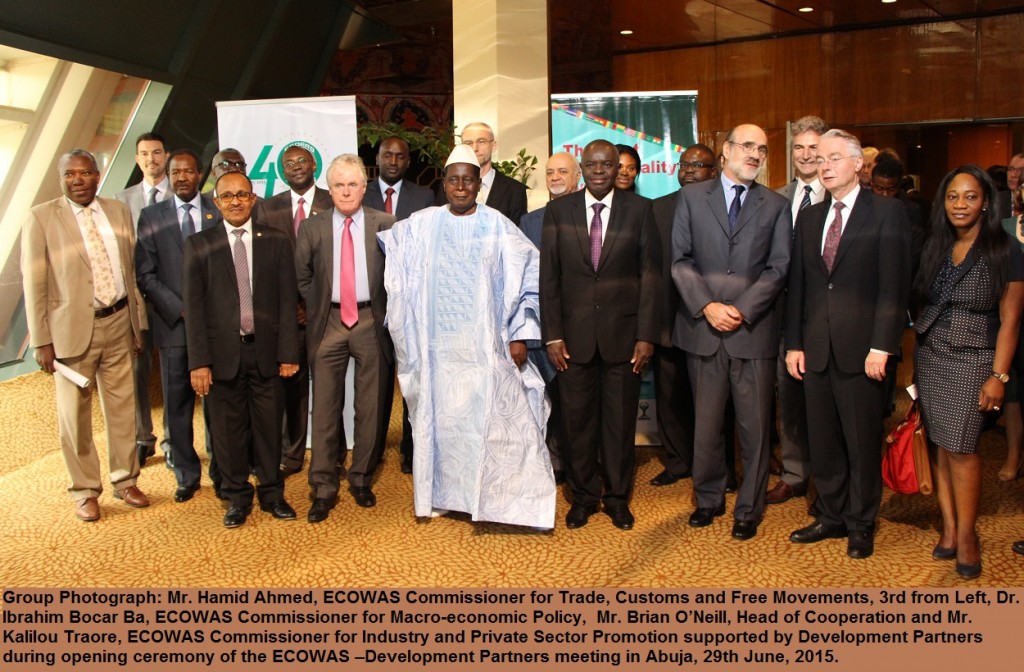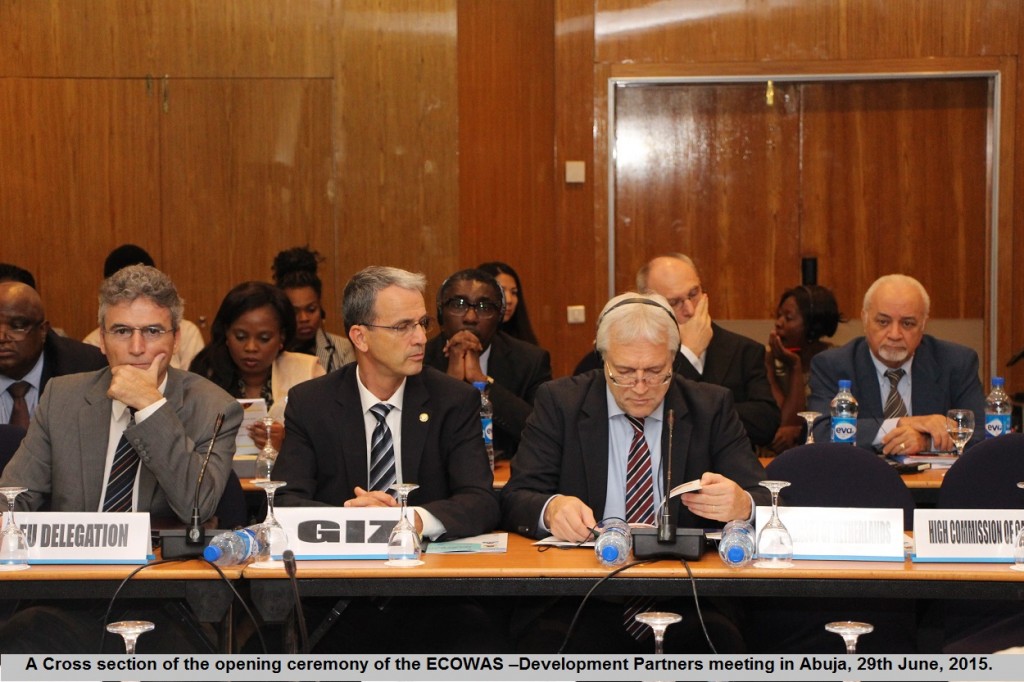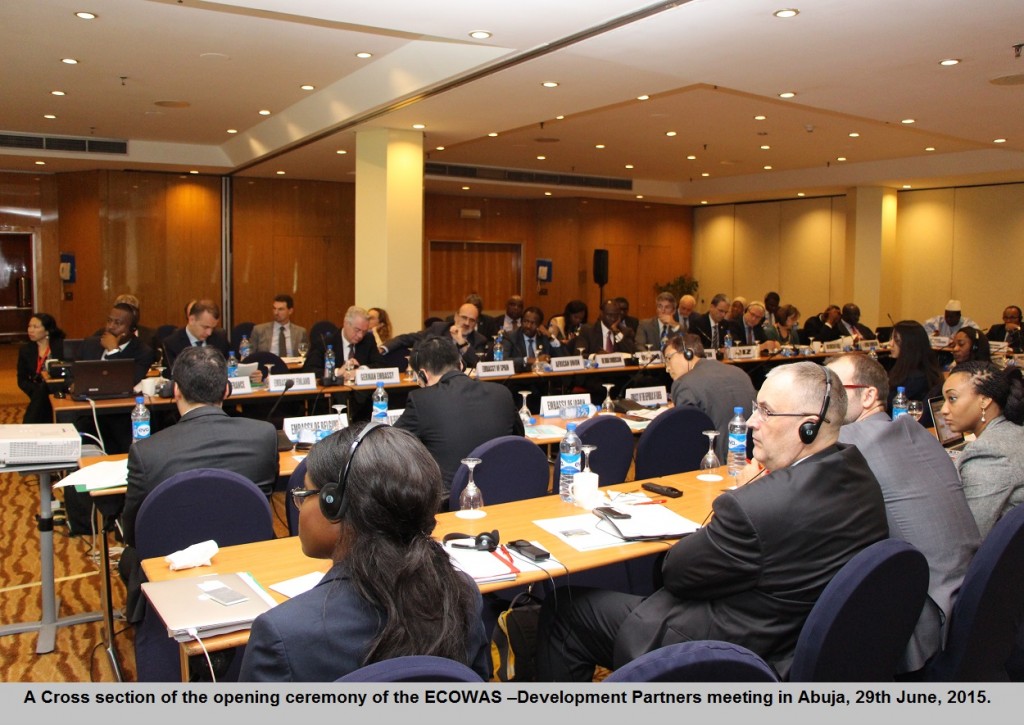ECOWAS, development partners consolidate economic integration cooperation programme
|
The ECOWAS Commission and its Development Partners have agreed to continue to work towards the full realization of their regional integration and development agenda for West Africa. The agreement was reached at the end of a one-day workshop in Abuja on the 29th of June 2015, with the theme Fostering Regional Economic Integration and Development in West Africa, where high officials from both sides of the table, having compared notes on the progress of their cooperation so far, pledged to harmonize a common regional strategy for the attainment of beneficial trade, Common External Tariff (CET), Community Development and Monetary Integration programmes as well as the positioning of the private sector for the economic advancement of the people of West Africa. Examining the current situation and the way forward having regards to the theme of the workshop- Fostering Regional Economic Integration and Development in West Africa, the experts made presentations on the status, challenges and needed political support for the CET implementation, the establishment of a customs union as well as intra-regional trade facilitation. There were also reviews given by the concerned ECOWAS Directors on the Community Development Programme (CDP), Monetary Cooperation, Private Sector Promotion Strategy and Projects as well as Industrial Strategy and Projects Giving a wrap-up of the three sessions of deliberations at the Transcorp Hilton hotel, the ECOWAS Commissioner for Macroeconomic Policy and Economic Research Dr. Ibrahim Bocar Ba said the strides made on monetary cooperation appraisal as well as the problems identified on the general issues of integration that was ventilated by the various experts, would lead to a much more stable region that is steadily attracting foreign investors in fulfillment of the dreams of the ECOWAS founding fathers. Among other submissions, the Commissioner told the development partners that there is now a need to work on the responsibilities of various partners on their roles concerning the idea of a monetary union in consonance with the decision taken in Dakar by the Heads of State and governments of ECOWAS for a facilitation of ECOWAS Monetary Cooperation Programme. Speaking on the European Union (EU)’s participation in the Abuja donor coordination workshop, the EU head of delegation to Nigeria who was represented by the organization’s head of Cooperation Mr. Brian O’Neill said ECOWAS and the EU are on the verge of finalizing the 11th European Development Fund (EDF). He also maintained that West Africa can become the next emerging global market stressing that once the cumbersome customs procedures and other administrative bottle necks are removed from the path of intra-regional trade, West Africa can be fully integrated into the global trade system. “With all its abundant human and natural resources, the only thing holding West Africa is itself. So we have to move from talking the talk to walking the talk knowing that the West African region is yet to equitably participate in global trade…” He added. In their presentations, the ECOWAS Directors of Trade Dr. Gbenga Obideyi and his counterpart at the Directorate of Multilateral Surveillance Dr. Nelson Magbagbeola sued for committed implementation of the ECOWAS trade and human development programmes stressing that the Automated Regional Transit Systems (ARTS) on custom interconnectivity for instance, would only be able to facilitate economic activities when this happens. Relying on the United Nations Conference on Trade and Development (UNCTAD) and other statistics, the integration experts craved a reversal of the current situation whereby it costs far less to transport goods from anywhere in Europe to either Lagos or Accra than to ferry products from one of the two West African cities to the other. The regional experts were therefore of the opinion that there is the need to focus more on non-tariff barriers even as the conflicts in the area has led to a situation where the prevalence of Internally Displaced Persons (IDPs) have severely disrupted intra-regional trade flows. Other officials of the Commission’s Directorates charged with specific mandates of integration who made presentations at the end of Jun e workshop included the ECOWAS Commissioner of Industry and private sector promotion Mr. Kalilou Traore, the Director of Customs Mr. Salifou Tiemtore, Coordinator of the Community Development Programme (CDP) Dr. Guevera Yao and Mr. Kamjika Ajoku who gave insights into the ECOWAS Industrial Policy Strategy. The ECOWAS Development Partners which participated at the workshop included European Union (EU), German International Cooperation Agency –Gesellschaft für Internationale Zusammenarbeit (GIZ), the United Nations Industrial Development Organisation (UNIDO) and others.
|






